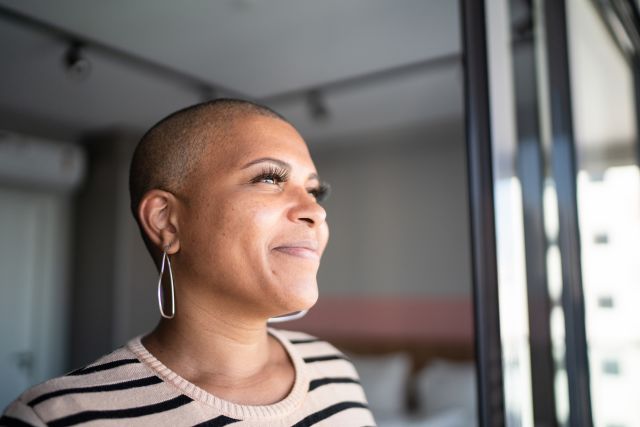Updated on April 5, 2024.
Having a mastectomy, or surgery to remove the breast, and reconstruction surgery as part of breast cancer treatment is a deeply personal decision. People with breast cancer often have a lot of research to do to learn about their treatment options, side effects, pain management, and prognosis (chances for recovery).
As surgery techniques have improved, there are also an increasing number of reconstruction options to consider, all designed to help recreate the look and feel of breasts. Those decisions can affect your quality of life and sense of self, or feelings and beliefs about yourself, after surgery.
How your body moves in the world, the way clothes fit, and how to plan an exercise routine after surgery are all part of recovery. So is sex. Both body image (thoughts and feelings you have about your body) and sexual function are affected by breast cancer surgery. Some people may abruptly experience symptoms of menopause (the absence of menstrual cycles for 12 months in a row) due to certain surgeries and therapies, which can affect sexual wellness, both emotionally and physically. Symptoms of menopause caninclude mood changes, difficulty sleeping, hot flashes, and pain during sex or changes in sexual arousal.
Julian Berrocal, MD, a breast surgeon at Women’s Health and Healing of the Palm Beaches in Florida, shares insights about ways to make decisions related to body image after mastectomy, along with ways to cope with the side effects of additional treatments.
Acknowledging your feelings can help
“When a woman sees herself naked in front of a mirror with a surgical scar, it can change how she views herself,” says Dr. Berrocal. “Surgeons work hard to make incisions so that the scar is as hidden as possible, so that she’s not always reminded of cancer.”
But with mastectomy, such subtlety isn’t always possible. As a result, some people may have trouble accepting their appearance, even if other people provide reassurance that they love them just as they are. After mastectomy, some people may doubt their attractiveness and sex appeal, affecting their desire for intimacy.
Today show host Hoda Kotb spoke in May 2022 about her breast cancer journey and how she was horrified by her breast cancer scars following her 2007 mastectomy and reconstruction. Fifteen years later, as she related on air, she’s accepted her new body and feels better than ever.
It’s natural to experience feelings of grief, anger, and sadness. It can help to acknoweldge and allow yourself to experience these feelings—and see if moving toward acceptance may help you focus on things that bring you happiness.
Breast reconstruction options
Although everyone has a different experience, breast reconstruction can help some people regain confidence in the way they look. It may come with other benefits, too, such as improvements in self-esteem, mental health and sense of sexuality. The procedure is typically performed by a cancer surgeon with a specialty in breast cancer.
Berrocal says that before breast cancer surgery, he typically discusses with patients possible breast reconstruction options.
"'Going flat' [leaving one side of the chest flat] is one option some patients choose,” says Berrocal, “and there should be no stigma in that.”
There are few instances, Berrocal adds, when reconstruction can’t be done at the same time as the surgery for breast cancer. In those cases, someone could opt for reconstruction after they have finished other cancer treatments.
In a 2014 study published in the Journal of Clinical Oncology, researchers looked at the records of over 20,000 women who had mastectomy for breast cancer from 1998 to 2007. Half of the women in the study were under age 51; half were older. The researchers found that, on average, 56 percent chose some type of breast reconstruction, with the rate rising in more recent years.
The Agency for Healthcare Research and Quality, meanwhile, reported in 2017 that in the 22 states studied, breast reconstruction after mastectomy rose 62 percent from 2009 to 2014.
Tattoos are an option
Some people who get reconstruction choose tattooing to create a nipple and areola (the colored skin around the nipple), says Berrocal. The Vinnie Myers Team in Finksburg, Maryland, for example, are a family-owned tattoo shop that specializes in custom three dimensioanl (3D) nipple and areola tattoos. Myers was inspired to provide this service after his sister went through breast cancer treatment. His daughter Anna also provides tattooing for people who have had mastectomy.
Some people choose other types of tattoos—beautiful works of art—tattooed over their breasts or flat chests to feel more empowered and comfortable with their new appearance.
Other treatment issues
According to Berrocal, another aspect of breast cancer treatment that can impact someone's sex life is whether or not they need additional treatment, such as chemotherapy (drugs go throughout your body and kill cancer cells) and radiation (high dose X-rays). Fatigue, nausea, and other symptoms can decrease sexual desire.
“Some types of chemotherapy can put women in menopause prematurely,” he says. “This can lead to hot flashes and vaginal dryness.” People who are treated with “anti-estrogen” medications like tamoxifen (which must be taken for five to 10 years) and anastrozole may also experience hot flashes and loss of sex drive, pain during sex, headaches, and depression. Anti-estrogen medications decrease levels of the female sex hormone estrogen.
"Vaginal lubricants can help with dryness,” says Berrocal. Since one function of estrogen is to create lubrication, applying an estrogen cream to the vagina can be helpful. Berrocal says that even though absorption of estrogen throughout the body is low when it's applied as a vaginal cream, some oncologists treating patients with tumors that are sensitive to estrogen recommend avoiding even a small dose applied to the vagina. The reason is because estrogen can promote the development of these types of breast cancers. The American College of Obstetricians and Gynecologists, meanwhile, supports the use of vaginal estrogen in breast cancer survivors. Your healthcare provider (HCP) can help advise on whether such treatments may be right for you.
Open communication can help
A return to a pre-breast cancer sex life may take about a year or two, says Berrocal, depending on treatment. Meanwhile, there are a variety of ways to foster emotional intimacy, even if you don’t feel ready for sex:
- Open and honest communication is key. A sexual partner may be uncertain about how to show affection—there may be fear of causing you pain—so it’s important to let them know what you’re thinking and how you’re feeling.
- Cuddling, hugging, and other signs of affection can be comforting and create an opportunity for these conversations until you feel ready to resume your sex life.
Some people have fears about what the future holds for their sex life. If you find yourselves stuck or unable to talk about sexual issues, it may help to see a counselor or join a support group to work through your concerns.
Looking ahead
“Surgeons are trained to talk about treatment and explain surgical options,” says Berrocal. But, he adds, someone shouldn’t hesitate to bring up problems and concerns about vaginal dryness, pain around the scars, or any other issues that could interfere with their sex life.
“Our focus is quality of life, and helping patients return to what it was before their cancer diagnosis,” he says. Open communication can make it possible to enjoy sex again after a mastectomy. For further questions about recovery from mastectomy and how your insurance may help cover some of the costs, speak with your healthcare provider.






